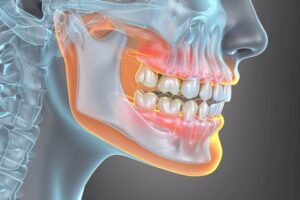
Jaw pain and other symptoms are hallmark indicators of TMJ disorders (TMDs). Sadly, TMDs are not widely understood because they can be a complex problem. Some patients experience symptoms for years before they receive necessary treatment! What should you know about these disorders and what they entail? This blog post provides some important basic information.
What Are TMJ Disorders?
You might sometimes hear people talking about TMJ disorder (TMD) in the singular. That is because even though various conditions can be classified as a TMJ disorder, they are often all lumped together as one condition. Some people refer to these issues simply as TMJ.
TMDs occur when the temporomandibular joints (TMJs) become damaged or stressed. These joints, which are located just in front of your ears, play a pivotal role in the movement of your lower jaw.
Anyone can develop a TMD. However, they are most common among women of childbearing age.
Symptoms of TMDs
You might have a TMD if you are experiencing any of the following:
- Jaw pain
- Pain and soreness in your facial muscles
- Difficulty chewing
- The sensation of lock jaw or limited jaw movement
- Ringing in your ears
- Frequent headaches
- Neck aches and back aches
- Clicking or popping noises in your jaw
What Causes TMDs?
TMJ disorders can have numerous causes, including:
- Jaw injuries: Trauma to the jaw from sports or accidents can lead to TMJ problems.
- Arthritis: Osteoarthritis or rheumatoid arthritis can cause TMDs as the cartilage in the joints suffers damage.
- A bad bite: If your upper and lower teeth do not work well together, it can place extra stress on your TMJs.
- Bruxism: Teeth grinding and clenching can place a lot of stress on your jaw joints, leading to TMJ disorders.
In some cases, the cause of TMDs remains unknown.
What Does Treatment Involve?
Dentists and dental specialists are among the most qualified practitioners to address TMJ disorders. They understand the intricacies of how the jaw joints work and can provide numerous treatment options.
Usually, they start with conservative approaches. For example, they might recommend at-home remedies, such as heat and ice therapy or jaw stretches. They may also provide a custom oral splint that is designed to stabilize the jaw and relax overworked facial muscles. BOTOX injections can also be helpful for reducing TMD-related pain. In rare cases, corrective jaw surgery is necessary to correct a badly misaligned bite and provide long-term pain relief.
TMJ disorders can be both painful and complex! Educating yourself about these conditions can be the first step on the road to improved jaw health and function.
Meet the Practice
Drs. Steve Koo and William Shepard are the experienced, highly skilled oral surgeons in our practice. They offer numerous treatments for TMJ disorders, from conservative options to multiple types of jaw surgery. If you are suffering from jaw pain and related symptoms, they would be pleased to evaluate your condition and recommend your next steps. To learn more about how our team may be able to serve you, contact Piney Point Oral and Maxillofacial Surgery in Katy at 832-353-1100.

